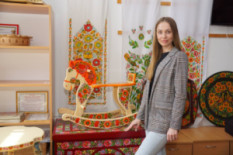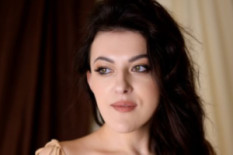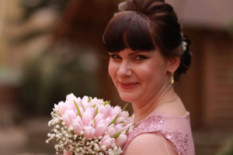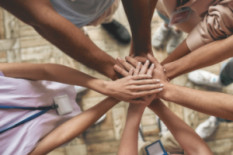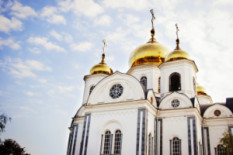Stories of Ukrainians who experienced occupation, whether on the frontline or near-front zones, often contain unspoken elements, read between the lines, or remain hidden in the depths of silence. These secrets may someday be revealed, or they may never be told. In our project about women who emerged from occupation, brought together by the charitable foundation "DobroTUT," this sense of unspokenness is also present. It often manifests through tears in their eyes, moments of doubt about sharing their experiences, and requests not to write about hidden aspects that occasionally emerge in personal conversations. I am immensely grateful for their trust and the opportunity to share these unspoken stories. Empathy is crucial in creating these texts; the implicit can be very expressive.
Today's protagonist is Lilia Anatoliivna Siver, a Ukrainian language and literature teacher from the "thrice-renamed," as she says, the town of Kamyanka in the Pologivsky district of Zaporizhzhia Oblast. Lilia left her native home on April 7 last year. She endured the occupation for over a month, enough time to experience the darkness of the "Russian world." This story also contains white spots, but at its core, it is about hope, powerful faith, and an indomitable spirit.
As Mrs. Lilia confesses, the powerful faith within her is supported by the familiar charitable foundation "DobroTUT" and its coordinator Lyudmyla Pasha, a woman from Mariupol who has her own challenging experience of emerging from occupation and extraordinary resilience, which helps support everyone who has lived or is still living through similar trials.
Now, it's time for Mrs. Lilia's narrative. She will share about her homeland, family, "strangers," and everything that helps her keep going.
When was your town occupied?
Our town is located 70 kilometers from Mariupol and 30 kilometers from the city of Polohy, our district center. Our house is about 400 meters from the Zaporizhzhia-Mariupol highway. So, the war came to our home very quickly. The town was shelled with 'Grad' rockets on March 2, and on March 3, the occupiers entered it.
Before that, there was a small battle, as I understand, with the local defense forces. They defended as much as they could. As far as I know, we had one tank and a few boys. The battles were fought about six kilometers from our town, near the station of Komysh Zoria. But the forces were unequal. The columns that came from the Berdiansk direction marched for hours. So, the boys retreated towards Polohy, and there were more severe battles there, but our people were also pushed back from there."

How was life during the occupation?
Everything changed rapidly. The occupiers came in and immediately imposed their orders. There were searches, shootings, and looting. First of all, they confiscated people's vehicles. It could happen that a person went to the pharmacy and they approached, asking whose car it was. If the owner didn't confess, they would give them a beating. Whether you like it or not, you must hand over the keys. Because not only your life was at stake, but others' lives could also be in danger. They went straight to our neighbor's home, already knowing his name and the car he owned. They simply said, "Give us the keys."
We were helpless. We all stood there, watching, but we could do nothing against armed, inhumane people. The main goal was to preserve our lives.
The scariest times were when it got dark until dawn because of constant shootings, and they argued and fought amongst themselves.
In the occupation, you never knew what could happen next. They evicted people from their homes, saying, "You have two hours to leave."
And they looted, they looted everything. They say a grandmother once told an occupier, "Son, you can't take all of this with you!" And he replied, "Everything will fit in my house." So let them have it all in their house.
Tell me about how you left Kamyanka.
We left on April 7. After the second search, we realized it would only worsen next time. It wouldn't be a search anymore but something much worse.
The first search was relatively tolerant, although I think that now, looking back, I see it that way. At the time, it didn't feel that way.
There were five of them, and each had a patch on their back that said "OMON Dagestan." The leader said, "We are here to look around peacefully." They immediately separated my husband and me: they took him around the yard and all our buildings while they took me inside the house. They checked every drawer, every one of them!
In our family, everyone had embroidered shirts, and we also had embroidered towels, pillows, and small carpets everywhere. The love for these things was passed down from generation to generation. And I am a Ukrainian language and literature teacher, so I had the most embroidered shirts. When we reached the wardrobe where they were hanging, I was anxious, but when I opened the door, I saw that the shirts were no longer there. My husband had realized it earlier and hid them. However, there was an embroidered belt hanging on the wardrobe door... I covered myself with it. But you can't hide everything. Many things in the house revealed who we were. I believe the occupiers were directed to us by "friendly" locals... They existed too. The search in our house lasted an hour, while they went in and out of our neighbors' homes... We realized that something was not right here.
There was even a funny incident during the search: when we reached the microwave, one of the occupiers said, "Open the safe!" We didn't have anything like that. I was initially puzzled, but then I realized and said, "Show me where the safe is, and I'll open it." And our "safe" turned out to be the gray microwave.
The second search started unexpectedly. At half-past seven in the morning, a BTR (armored personnel carrier) came crashing through the closed iron gates with occupiers inside. "Show us everything!" they said. And again, it was all the same – searching the attic, the cellar, the barn – everywhere. They even used a probe to check the ground in the little garden with flowers. This happened just a day after the first search.
By then, we realized that we needed to do something. We had to leave. The threat was evident; besides, we required medications for my father, who had undergone heart surgery shortly before the war. He needed to take his medicines regularly, but all the pharmacies in the town were already empty. So my husband and I began preparing to leave, more mentally than anything, as uncertainty was ahead.
What about your children?
On February 24th, at six in the morning, our son came from Dnipro to us. He brought medications for his grandfather. And on the 25th, it was my mother's birthday. That was probably the last day when the entire family gathered together. Now, unfortunately, we don't even have video communication. Our daughter, a university student in Dnipro, was also at home after her winter exams. So, at the beginning of the war, our children were with us.
We quickly realized that we needed to save the children. They were adults, but it was an additional risk. Especially since we already had information about what was happening in other occupied towns. There was no evacuation, so we looked for someone to take them out. Closer to the end of March, one man volunteered to take them away.
There were 11 "Luhansk People's Republic" (LPR) checkpoints when they left. The children managed to pass through them relatively calmly. But after about two weeks, when we decided to make the same move, there were 18 checkpoints. One of them was right near our yard. They set it up overnight before our departure. We understood they might not let us go, so we rolled the car without starting it to avoid attracting attention. We bypassed the checkpoint using a different street. We formed a "convoy" – three cars and four families (we took our neighbors with us, whose car the Russians had taken away).
I remember that before leaving, I tried to delete all the patriotic content from my phone – different chats, channels, etc. But there was hardly any connection, so nothing was deleted: I cleared it up in the evening, and everything was back in place in the morning. So, I hid my phone in the spare tire in the trunk for safety. Our old-fashioned phones looked suspicious, but we passed through the checkpoints with them.

What impressed you the most during this journey to free Ukraine?
A bridge was blown up after one of the checkpoints we had already passed. The detour road was completely mined. We had to drive so that the mines would pass between the wheels... We thought we had gone through the most challenging test then, but no. Another checkpoint was on the other side of the bridge, about 50 meters away. We decided not to stop because we had just been checked and continued. However, an automatic burst of gunfire stopped us in front of the car. The occupiers said they would also inspect us. What could have changed during the short drive through the minefield? Unclear.
Who knows these Ukrainians...
Yes. They probably thought we had taken one mine into the car.
And at the last checkpoint, there was a major's flag. But even from a distance, it was clear it wasn't ours. So we didn't express any joy about the flag. Later, in Zaporizhzhia, at the refugee center, we were told that in a similar situation, one family was shot... for saying "Glory to Ukraine." It turns out the occupiers were trying to provoke us.
What were your first days in Dnipro like?
I recall having a breakdown here on the first night. When a street cleaning machine passed by outside the window. It triggered memories of enemy vehicles moving through our town day and night. A regular car stirred up all that accumulated fear.
Did your father stay at home?
My father refused to go with us; he and my mother stayed behind. He said everything at home supported him until the liberators drove a tank into the garage next to our house at the end of April. My father never showed emotions, but he was deeply affected internally. They were destroying everything he had built with his hands and everything he had put his soul into. Those inhumane people were sitting on the tank and laughing. They laughed and left... But unfortunately, my father's heart couldn't handle it. The Russians didn't even allow emergency help to arrive. It seems to be their goal to do everything to make the elderly people die. It was my first significant loss...
My father was buried properly thanks to fellow villagers who went, begged, and insisted. But I couldn't come because it was a risk to my life... I thought I would manage to return home in August, but then that terrible incident happened when a column of people returning home was shot. My mother forbade me to come. She said, "Then that's how it should be. You are needed where you are."
Is she still there?
Yes. My brother is with her. At first, they considered leaving, but after those events, they said, "We'll stay here. We'll wait for you at home. You are the branch, and we are the roots. And roots must stay on native land."
I really hope everything will be okay for them.
How did you settle down here?
We rent a place for a very reasonable price from an acquaintance currently abroad. I worked online at school, thanks to our principal, who organized remote learning. My husband recently got a job. Our daughter-in-law returned from Slovakia with our granddaughter, so we have both care and joy.
Our son enlisted in the army after escaping the occupation... So he also protects us.
After we had adapted a bit here, we got to know people from the "Obereh" center who were making camouflage nets. And we went there every day to help. It also comforted us because it's important to understand that you can help somehow.
Then we got acquainted with the "DobroTUT" foundation. During our first action, they provided us with public transportation tickets. It was quite a substantial help for us since we weren't working at the time. We used those tickets to go to "Obereh" to weave the nets.

But at first, it was difficult for me to accept help. Not easy at all. But over time, I understood that this is how it works – we help and receive help...
And then we joined the "DobroTUT" social networks, and something incredible began. So many events! We visited theaters and cinemas, watched cartoons, attended workshops, and celebrated.
But you know, I had moments of internal struggle even here. Because I know how difficult it is for people in the occupied territories, it was hard to allow myself to attend such entertainment events. Just realizing that we can have all this here while they are there...
Such a parallel reality that's hard to comprehend. My mother said that cutting yourself over what you're experiencing now won't change anything. It won't make anyone else better off. So, if there's an opportunity, use every positive moment. Your disbelief won't make anyone else better.
You listened to her, right?
I listened, and every time there was an event from "DobroTUT," I participated. And in a conversation with my son, I once said, "It's hard for you there, and we feel completely different here." And he replied, "You have your work there, and I have mine."
When I got to know Mrs. Lyudmyla... She's a woman who gives life. And then it became easier for me. There are people like that... When Lyudmyla and I first met – she was a stranger to me, but her optimism, support, and energy started to fill me up. Instantly, it felt like we had known each other our entire lives. She's like that dandelion whose "parachutes" of goodness scatter and take root in everyone's souls.
It seems like you're engaged in literature. So poetic.
I always thought that poetry wasn't my thing. I usually edit children's works, send them to contests, or something like that. But with "DobroTUT," I did participate in a contest for Native Language Day. And when the results were announced, it turned out that my lines also deserved attention. So I received my first certificate from the "Akvarel" store studio. I bought paint-by-numbers pictures for myself. My family was a bit surprised. Their mother was never particularly known for her artistic talents. My mother embroiders, bakes, she can make flower bouquets, but to paint – that's something entirely new. And I discovered painting through "DobroTUT." I painted my first picture before Christmas, during a workshop for mothers. It was an angel. I decided it would be a gift for my granddaughter. But when I brought the gift, she looked at it and said, "This is Lilia!" Now everyone laughs, saying I painted a self-portrait.


Do these activities inspire you?
When painting, you completely detach from what's happening now and what's happened. You reset. It's just incredible! I believe these activities are very important. When my mother paints, interacts, fills herself up, and then comes home – she's rested, happy, and with a painting. It somehow makes everything smoother in the family.
A lot of things inspire me. For example, I volunteered at a festival on the foundation's anniversary – helping kids decorate gingerbread cookies. It's so exciting – interacting with kids is just amazing! I was pleased!
At the festival, in general, it was very warm. Strangers gathered, but everyone felt so familiar, which was impressive. Such support, such a spirit of positivity and unity!
And we also have a fitness group that I started attending. My family laughs at me: Mom and sports don't go together. But I love everything there: the interactions, hugs, and easy exercises outdoors. You do them as best as you can, and you feel satisfied.
I've made friends through "DobroTUT" as well. And that makes things a bit easier too. Sometimes we come, hug each other, and stay silent. We're already so close that words aren't necessary.

Do you think you've somewhat adapted to this parallel life?
I believe so, but I want to go back home. But problems must be solved step by step, and we must live here now because there won't be another life. So we live...
For example, my husband and I visited the opera theater for the first time. And not just once. We used to visit various theaters but had never been to the opera before. I often remember Mariupol now. We used to visit theaters there regularly. Once, there was a big open-air theater festival. We attended many performances, saw a lot, and took pictures. And now, when we look at those photos, we remember how the city was and is now. It's also a parallel reality that's hard to grasp.
But it's direct proof that you must visit, see, and document everything if possible. Because that Mariupol is only in our photos and memories now. And so, we must seize the moments now, too, because nobody knows what tomorrow will bring.
This is probably one of your insights, right? What else have you realized?
Indeed, the essence of "DobroTUT" is to be kinder to one another. These times... We need to support each other.
And I've also realized the priority of inner well-being over external appearance.
For instance, I spent a year without fancy clothes, heels, makeup, and elaborate hairstyles. Even though I used to think, "You're a teacher. You should have a certain level." Of course, one shouldn't let themselves go. Somehow you need to keep yourself together. But if there's no super opportunity, it's not a tragedy. Happiness truly lies in communication, mutual understanding, and mutual support. These values are now fundamental.
And most importantly, I wish everyone to be alive and healthy so that we can all experience that turning point and overcome our trials. So that we can win and have the strength to rebuild. That's what matters most to me.
I always ask about the main dream, and you seem to have voiced it...
Yes. My biggest dream is for all of us to meet together and for everyone to be healthy and, if possible, alive.
For Ukraine to be victorious and for us to continue building our happy future.
We all wish for that very much. I pray daily for the guys to hold on and have the strength to endure.
And of course, I dream we'll all return to our homes very soon.
This war has brought a lot of sorrow to every family, and we all believe everything will improve.

And what supports your belief?
Besides family, also the "DobroTUT" community. If not for them, it would be such depression that I don't know if you could climb out of it. This support is invaluable. It's priceless.
You see, I didn't mention the image of a dandelion by chance. These seeds-parachutes of goodness, after all, scatter, take root, and grow. I feel it myself. Each of these little fluffs takes root somewhere and sprouts again and again. And then new dandelions will sow goodness and be here again. Always.
